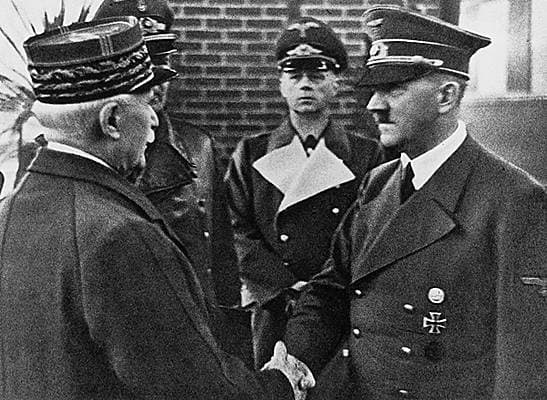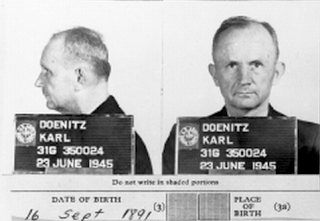This retributive justice stands in gross contradiction to those peace-treaties whose goal had been genuine peace. After the victory over Russia in 1917, in the Treaty of Brest-Litovsk, it was explicitly stated that the prosecution of all crimes and offenses committed in relation to the conduct of the war was waived. Germany granted this although the First World War had been caused not least by Russian foreign policy.
In June 1940 in the Forest of Compiègne the vanquished were not treated like the Germans in 1919, as defendants, but instead with all honors that a chivalrous victor can accord to a defeated adversary. Hitler maintained the same manner toward conquered France that Prince Bismarck had used with Napoleon III. What a contrast to the disreputable and insulting measures with which the Allied politicians and commanders tried to humiliate the Reich’s government and Grand Admiral Doenitz! What a contrast between the events in Flensburg [where the short-lived successor to Adolf Hitler’s government surrendered in May 1945] and the capitulation of Sedan [where Napoleon III was captured in September 1870]. Once upon a time the Treaty of Frankfurt [after the Franco-Prussian War] was concluded according to the “tabula rasa principle.” In article II, section 2, was stated:
Neither the person nor the property of any inhabitant of the ceded territory may be prosecuted, harassed, or arrested because of his military or political actions during the war.
That was 1871, and it was the foundation for a 43-year European peace.
Do not come protesting that this was a less cruel war than that of 1939-1945. After all, those brutalities at least happened on both sides. To whatever barbarities the Second World War may also have degenerated, even more atrocities were committed and victims claimed in the Thirty Years’ War. But these disturbing atrocities lasting three decades finally ended at Muenster in 1648 with the Treaty of Westphalia, wherein §2 holds this as a “sacred principle”:
On both sides, whatever hostilities have happened from the beginning of this discord, however and wherever, by whichever side, in whichever direction, should be eternally forgotten…. Moreover each and every offense, outrage, and hostility inflicted both before the war and during the war, in whichever direction, without any regard for the person, should be entirely dismissed in such a way that whatever one could claim against the other because of it be buried in eternal forgetfulness.
That was 300 years ago, in the dim past, and now in the neon-light of the present, after centuries of liberalization and democratization, a European people of culture is subjected to a tribunal that, behind a legal façade, knows only primitive retribution.
Even at the end of the First World War, in Article VI of the armistice of 11 November 1918 the victorious states voluntarily ruled out that any inhabitant of the German territory to be occupied by the Allies would be prosecuted because of participation in acts of war. Only when the Germans laid down their arms, putting faith in this document, was International Law violated and the extradition of the Kaiser and “punishment” of his political and military leaders demanded in Versailles.
Despite an insane international agitation against conquered Germany, there was still an attempt to preserve at least the appearance of law, and the conduct of so-called trials of war-criminals were left to the Reich’s Court at Leipzig, which conducted twelve such trials, of which six led to acquittals and the others to imprisonment.
The extradition of the Kaiser ran aground on the constitutional stance of the neutral Dutch government.
As an oversized Versailles after the Second World War was demanded, the war against the defeated was continued with juristic means. From this un-peace (Unfrieden) no genuine reconciliation could come. The consequences are familiar. They led to that condition that one can properly designate only as the armistice between the Second and Third World Wars. The peace was not prepared during the war, as Fichte demanded, but instead in the middle of the war, on [13 January 1942] in St. James’s Palace, the Allies’ chief goal was proclaimed as waging war for the punishment of “war-criminals.”[1]
With the London Charter the legal principles seem finally to be secured. With the adoption of the Soviet legal ideology and show-trial methods, the pseudo-juristic preparations are concluded. On 8 August 1945 the convention about the constitution of the military tribunal is completed, and the charter is signed by the delegates of France, England, America, and the Soviet Union.
Article 24 of the charter resembles normal procedure, until one recognizes the prerequisites for a one-sided victor’s justice in the restriction provided under “(d),” that the Tribunal can decide arbitrarily “about the admissibility of any such evidence,” or in part “(e)” which specifies that only “such rebutting evidence as may be held by the Tribunal to be admissible” is allowed.
How that evidence looks that is “held by the Tribunal to be admissible,” we shall yet depict. The almost incomprehensible mass of documents, key documents, affidavits, and interrogation-transcripts that the occupying powers have provided for themselves in their own unaccountable proceedings, these massive heaps of “documents,” are to this day the intellectual arsenal of the whole literature and journalism of reeducation; they still show up again and again in all political trials. According to the desire of the prosecutor they are supposed to have effects for decades to come. The very famous leftist attorney-general Dr. Bauer[2] openly admits that that material prepared according to Nikitchenko’s method has been and will be made the foundation for all other prosecutions. In a broadcast of 15 and 18 August 1963 via Norddeutsche Rundfunk, Bauer affirms:
“The decision in all our trials is reached through documents. Thus it was already in Nuremberg. The foundation of all trials today is, as always, the documentation from Nuremberg.”
_________________________________
[1]. Haertle gives the date as 15 January 1941, but that seems to be incorrect. The Associated Press reported on 13 January 1942 that on that day “the governments in exile of the Netherlands, Belgium, Yugoslavia, Norway, Greece, Luxemburg, Poland, Czecho-Slovakia and the Free French committee laid the groundwork for postwar machinery which may someday doom axis officials and solders judged to have behaved contrary to the ‘accepted ideas concerning acts of war’.”
[2]. Fritz Bauer was a Jew and Social-Democrat who had been imprisoned during Hitler’s rule. After the war, as Attorney-General of Hesse, Bauer played a central role in the Frankfurt Auschwitz Trials of 1963-1968.



